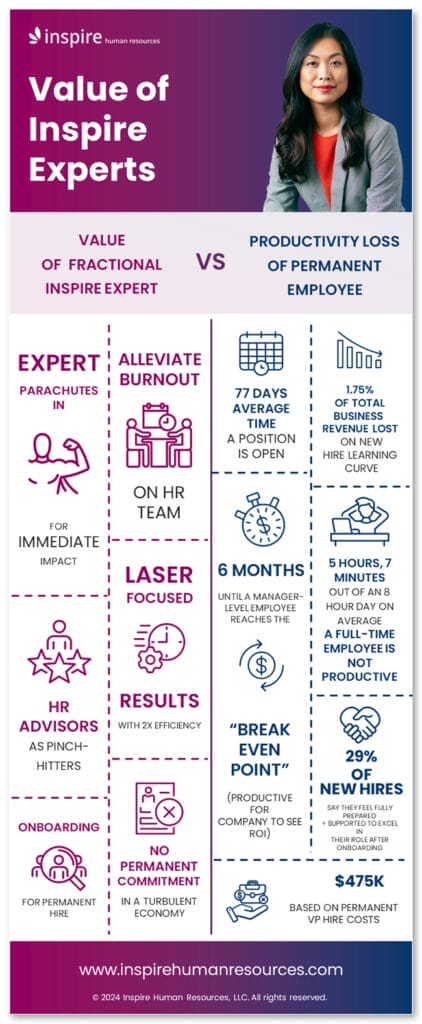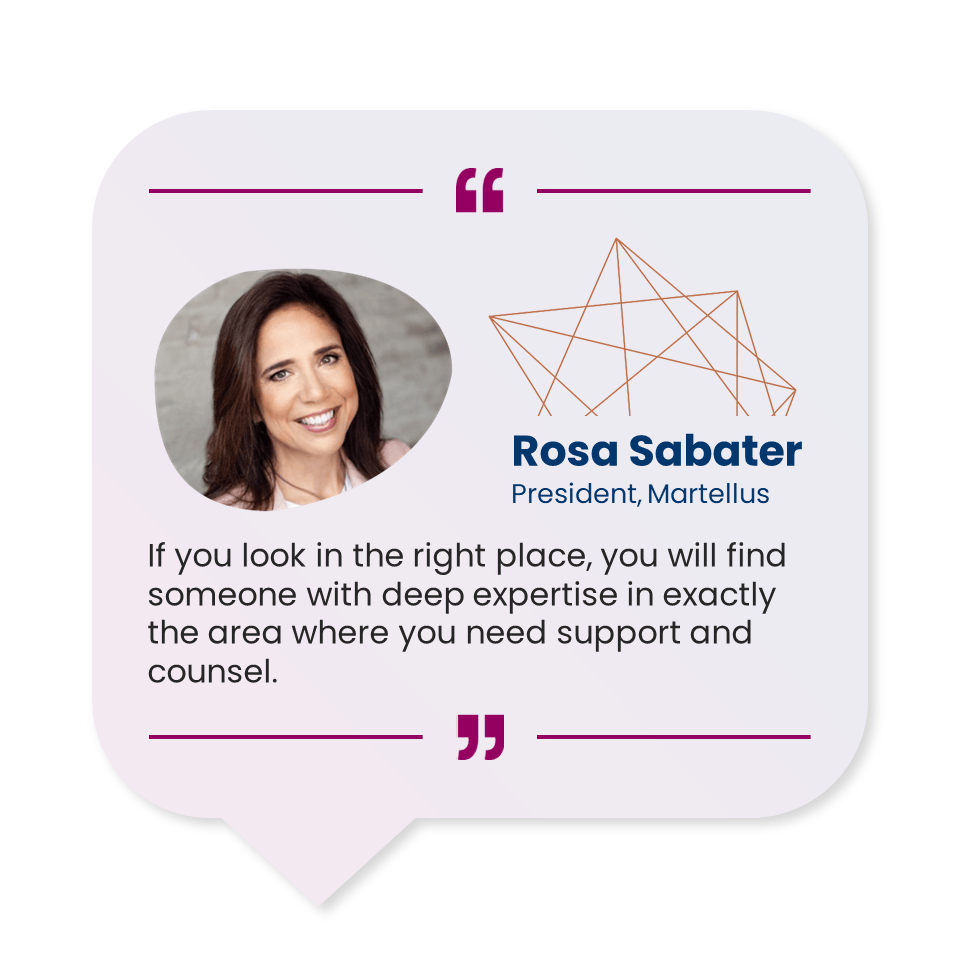
What is fractional talent?
FEB 20, 2024
What is fractional talent? Have you been hearing the term more often these days, but not quite sure what it refers to?
Inspire blazed the trail for fractional HR services in 2007, when this mode of working was a hidden gem for companies who crossed our path. Fast forward to today, 62% of organizations consider contingent labor to be a “vital component” of their overall workforce, according to research firm Ardent Partners.
We’re thrilled to see so many companies embracing fractional talent as a cornerstone of their workforce planning—a strategy that allows them to dial their talent resources up or down as the economy shifts.
The growth of fractional talent is no surprise. As challenges like talent shortages, imposed hiring freezes, increased workloads, and rising employee burnout have stifled almost every leader, fractional talent is a strategic and cost-effective solution.
But back to the original question: what is fractional talent? We are hearing from countless business and HR leaders that they aren’t quite sure what fractional talent means, and many assume it is limited to fractional interim executives. So we’re clearing up the confusion with these frequently asked questions about fractional talent:
What is fractional talent?
Fractional talent is an on-demand, flexible resource that allows companies to expand and contract their workforce as needed. Also frequently referred to as gig, contingent, or independent workers, fractional talent refers to professionals, from mid to senior level, who work flexibly with a company on a contract basis, for a set amount of time. Terms of the contracts vary to include interim assignments or project-based engagements based on hours, months, or set deliverables.
Companies may employ fractional talent as freelancers, or they may turn to a firm like Inspire HR. Fractional talent firms like Inspire assist in matching companies with the perfect expert to meet their goals, while supporting the engagement throughout its duration.
Which companies benefit most from fractional talent?
Fractional talent is a flexible model that can benefit companies of all sizes, at any stage of growth.
Large, established companies benefit significantly from engaging fractional talent in various ways. They may bring in a fractional expert to lead a strategic project, advise or coach mid to senior level leaders, or fill gaps without the commitment of a full-time hire. Large companies may also engage an interim executive or bring in niche expertise to address temporary company needs. Additionally, fractional talent can help companies through periods of uncertainty by filling outstanding talent needs amidst hiring freezes.
High-growth companies can engage fractional talent to fill temporary gaps and maintain productivity as the hiring team ramps up to fill new roles. Fractional talent can also help carry the business forward without a long-term commitment as the team carefully identifies its workforce needs.
Startups and small businesses benefit from fractional talent by gaining access to top-tier expertise that fits within their budget. This allows them to increase productivity or advance crucial initiatives while staying lean, insulating themselves from risk (especially in an uncertain economic climate), and building a best place to work culture.
Can we afford fractional talent?
The cost to engage fractional talent will vary depending on the specific skills and experience required and the scope of the project. An hourly or project fee for fractional talent is a service cost and does not include additional employment costs like payroll tax, fringe benefits, recruiting, onboarding, and others. For example, in marketing, it is estimated that hiring a fractional marketer will save a company 30-40% over hiring a permanent employee.
We created this cost-benefit analysis to compare hiring a full-time employee with engaging a fractional HR Expert across factors including budget management, productivity, retention, and employee engagement.


How long is a typical fractional engagement?
Fractional talent typically works on a part-time or project basis, offering flexibility in time and budget management. Depending on the needs of a business and the availability of the fractional professional, an engagement can last as long as needed, up to several years. In our experience as fractional experts for more than 17 years, we have found that 3 months is the minimum length of an engagement to ensure optimal results, and our engagements with clients typically last between 3 and 6 months.
Does fractional talent work exclusively in executive roles?
Fractional work engagements are not limited to executive roles.
Senior level fractional talent fill executive roles like interim chief human resources officer (CHRO) or interim chief marketing officer (CMO) and would also serve as advisors and strategists. However, mid level fractional talent is often employed in roles like benefits administrator, budget analyst, controller, marketing manager, and others.
What are examples of projects fractional talent could help me with?
Fractional talent can help companies in a variety of ways, from providing strategic leadership, advising existing leaders, contributing specialized expertise, or filling in for a role that will be open for an extended period due to parental leave, leave of absence, difficulty hiring, or another reason.
At Inspire, our most common engagements include:
- Interim roles: CHRO, senior or mid level HRBP, compensation, benefits, talent management or talent acquisition
- Analysis of compensation strategy and creation of consistent salary bands
- Projects to optimize or restructure performance management processes
- Leadership and/or group coaching
- Assessments of the current HR structure, with recommendations for opportunities to create an engaging, productive, and truly modern HR function
When should I engage fractional talent?
We tell business leaders that it’s always a good time to build their network of fractional experts across various functions, from Inspire in HR to Early Growth in finance, Martellus in marketing, and Vannin in chief of staff. Then, you have who you need on speed dial, precisely when you need them.
In addition for filling a gap when a role is open or an employee is on leave, Rosa Sabater, President of Martellus, advises companies that there are several particularly advantageous times to supplement a team with fractional talent:
You need strategy and execution, but your budget won’t allow for two full-time people. Fractional talent allows leaders to build the precise team they need for that particular moment, without committing to permanent positions.
You have a time-sensitive deliverable and want to give it a jump start. Firms like Inspire and Martellus have built teams of Experts whose collective skills have touched on every challenge in a particular field – saving companies the time and resources it takes to acquire that knowledge internally.


Leaders or teams are new to a role or they have new responsibilities. Fractional talent can serve as an onramp for leaders – shortening the learning curve and boosting engagement and productivity.
You need a fresh perspective from someone outside of the company. An Expert with extensive experience and credibility may be just what you need to facilitate cross-functional conversations that drive decision-making.
The beauty of fractional talent is you don’t have to rely on a one-size-fits-all approach. This flexible model gives you the ability to stretch exactly when and how you need, for only as long as you need.
If you’re still not sure if fractional talent is right for you or you’re ready to uplevel your HR team today, email us at hello@inspirehumanresources.com. We’re happy to answer any of your questions.



